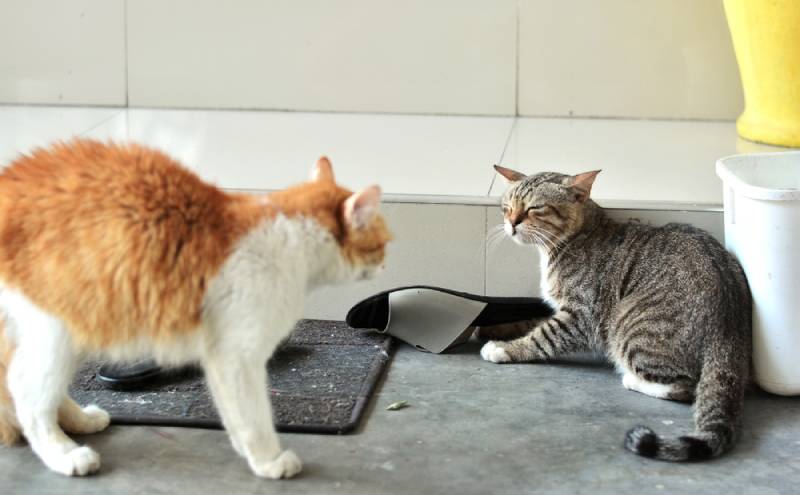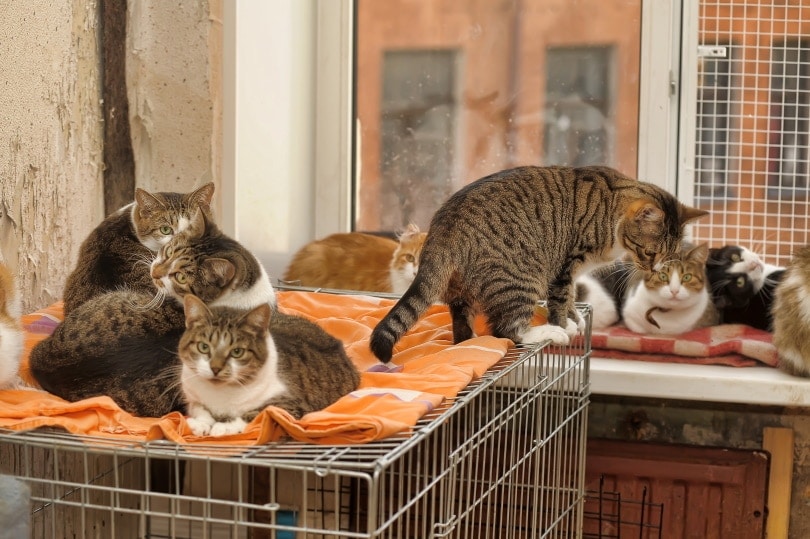Do Two Male Cats Get Along Better Than Two Female Cats? Vet Reviewed Facts
Updated on

If you have a cat at home and are debating on adding a new one to the household, you’re likely worried about your original cat. The last thing that you want is a stressful situation for everyone in your home!
Perhaps you want to bring two cats home at the same time and are wondering which two sexes will get along best. This question can’t be answered directly, as it all comes down to each individual cat. Some male cats will do well together, while others won’t, and some female cats will get along beautifully, but others will fight.
Cats as a species are naturally solitary and the majority of cats will prefer to live alone. Some cats are more socially flexible and unowned cats can form colonies of related females.
Here, we go into all the reasons that this is a difficult question to answer, as well as the most important factors when choosing a new cat to introduce to your current cat.
Littermates
The easiest pairing between cats is usually with siblings: Growing up together in the same litter can form a strong bond. This goes for any sex pairing: two males, two females, or one male and one female.
Bringing home two kittens or adopting two adult cats from the same litter often offers the best chance that two cats will get along. This isn’t to say that they won’t fight at times. Just like people, they will have occasional spats with their siblings. Some siblings, as with any two cats, may co-habit happily for a time and then develop problems later.
Still, kittens and adult cats tend to get along with their littermates regardless of sex. Not only are they familiar, but they also learn fundamental lessons from each other, such as how to hunt and play—and how to not play too rough.
This is why it’s so important not to remove kittens from their littermates and mothers too soon; 12 weeks should be the absolute earliest.
But beyond being littermates, the other essential part of bringing two siblings home is that they will likely have similar energy levels and experiences. If they are still kittens, speak to the breeder about the two that get along the best.
It is important to remember that kittens from the same litter may have different fathers and so have different genetic influences.

Can Male Cats Live With Other Male Cats?
This depends on several factors, but you’ll want to aim for a new cat that’s roughly the same age and has a similar temperament. Also, they should both be neutered! Unneutered males can be competitively territorial. While neutered males will be less territorial, it does depend on their temperament. You might find a territorial female and a laid back male.
So, two unrelated males can live together peacefully, but it depends on their personalities.
Can Female Cats Live With Other Female Cats?
Female cats are capable of living with each other, but it depends on their respective temperaments. There is the possibility of aggression, but they are more likely to display signs of jealousy when they want your attention and only one receives it.
One female cat might have a strong territorial instinct, while another will have no issue sharing her space.

Can a Male Cat and a Female Cat Live Together?
This is almost no different than cats of the same sex living together. Male and female cats are just as likely to fight for attention and territory.
In fact, how territorial a cat is does not depend on their sex, but rather on their temperament. That said, unneutered males are more likely to display territorial behavior.
If you own a female cat, you might notice that she appears agitated or growls at cats outside the house. But not all cats, male or female, will necessarily do this.
How to Pick a New Cat
Like everything in life, nothing is certain. But if you carefully select a new cat, it is possible that your old cat might enjoy a new companion.
It doesn’t really matter what sex the new cat is; it’s far more important that they match in temperament and activity level. A calm cat won’t necessarily appreciate an excitable cat, and a timid cat likely won’t be thrilled with a rambunctious one.

Here are a few considerations for picking a companion cat:
- If you have a young and energetic male, you can opt for another male cat that is roughly the same age and will happily join in on lively playtime.
- A calm and neutered mature male might do quite well with a kitten of either sex. Male cats can be excellent surrogate parents, sometimes better than spayed females.
- An adult female cat that has never lived with another cat might do best with a young female.
Two males and two females can bond as long as they don’t both have anxious personalities. Anxious cats tend to engage in scent-marking behavior and take over high spaces and doorways. Two cats with these traits will likely be unhappy together.
 Top 4 Considerations for a New Cat
Top 4 Considerations for a New Cat
There are four factors that you should consider while choosing a new cat to introduce to your resident cat.
1. Age
You’ll want to pair your current cat with a new cat that is of a similar age. For example, you don’t want to bring home an energetic young cat when you have a calm, senior cat.
The younger cat will likely become frustrated due to not being able to play as much as they prefer, and the senior cat might be irritated at having their sleep constantly interrupted.
Also, if your senior cat has an illness or otherwise doesn’t have much longer to live, it’s best if you don’t bring a new cat home until after they have passed. Changing the dynamic in your home can cause stress and might worsen the illness. You want your cat’s final years to be as peaceful and stress free as possible.

2. Size
While cat breeds don’t vary in size the same way that dog breeds do, some cats are much smaller or larger than others. Size can make a difference in the dynamics between cats, especially if your current cat is strong. Aim for a new cat that’s roughly the same size or slightly smaller than your current cat.
3. Temperament
Use your resident cat’s temperament to guide you in finding a new cat. If your current cat is quiet and timid, look for a calm and mellow cat for a companion. If your resident cat is dominant, they should do well with a calm and confident companion.
Keep in mind that it will be difficult to gauge temperaments if you’re looking at cats in a shelter. It’s easier to see the personalities of cats in foster care.

4. Sex
Sex isn’t the best determinant of how well two cats will get along. The science is not conclusive on which sex of cats live together more happily. However, it is generally believed that neutered male cats tend to be more accepting of other cats, regardless of sex. It’s also believed that female cats might be less tolerant of other female cats. But temperament and age are the most important points when choosing a new cat.
 Conclusion
Conclusion
Sex isn’t as important as matching up the cats’ size, age, and temperament. Bear in mind that many cats will not live happily with another cat, which is essential to note if you have a senior cat with deteriorating health.
If you are looking for a new cat in animal shelters and rescue groups, speak to the staff and volunteers. Let them know what kind of cat you’re looking for; they will have a better idea of which cat might fit the bill.
Take introductions slowly. Cats don’t love change, and it will take a while for them to adjust to a new addition. Keep them separated for a few days, and hopefully, whether they are both male or both female, they will end up becoming close companions in time.
See also:
- My Cats Used to Get Along But Now They Fight (Here’s Why)
- Do Male Cats Scratch More Than Females? Facts & Care Tips
Featured Image Credit: Magui RF, Shutterstock














